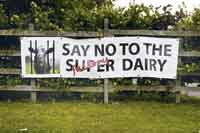Super dairy poses unacceptable environmental risk

Plans for a 3700-cow “super dairy” in Lincolnshire pose an unacceptable risk of pollution, the Environment Agency has warned.
It has lodged a formal objection to the super dairy proposal with North Kesteven District Council, which is considering the planning application.
“We object to this application as submitted because the proposed development would pose an unacceptable risk of pollution to groundwater,” the agency said.
The objection is a setback for Nocton Dairies, the farmer-owned company hoping to set up the dairy farm at Nocton Heath, south of Lincoln.
Nocton Heath sits on an underground aquifer, which acts as a water supply for the local community.
The local public water supply goes to some 74,000 properties, which equates to a population of about 170,000 people.
The Nocton proposal must satisfy the Environment Agency there is no risk of pollution, or planning permission could be refused.
The agency said the Lincolnshire Limestone was a highly fractured aquifer, which meant pollutants could travel quickly to groundwater below.
“In environmental terms, a dairy unit would not normally be considered high-risk, hence the lack of direct regulation of such activities,” the agency said.
But the production, handling and conveyance of large volumes of slurry and digestate on top of an un-protected aquifer presented a significant risk.
“Groundwater pollution leaves little or no indication that it has occurred until it impacts the receptors we want to protect,” the agency warned.
“In addition, groundwater pollution is difficult, slow and expensive to remediate.
“Although less potent than raw slurry, digestate contains high concentrations of pollutants including nitrate.”
The agency said its own statistics showed that the dairy industry was responsible for a relatively high number of pollution incidents.
It acknowledged that the Nocton development proposed a higher standard of engineering than traditionally seen on smaller dairy farms.
But it warned that many incidents were caused by human error (for example a valve left open) or unforeseen circumstances.
“We agree the risk of groundwater pollution can be reduced at the design stage,” the agency said.
“However, it is reasonable to assume there will be pollution incidents associated with the day-to-day operation of the proposed dairy.
“We consider these risks are unacceptable at this location.”
A Nocton Dairies spokeswoman said she was aware of the Environment Agency’s response and was in the process of clarifying a number of points raised.
“This is a completely normal part of the planning process, of which we are still in the fairly early stages,” the spokeswoman said.
There were 324 pollution incidents from the dairy industry in England in 2009 – a quarter of all reported farming related pollution incidents.
